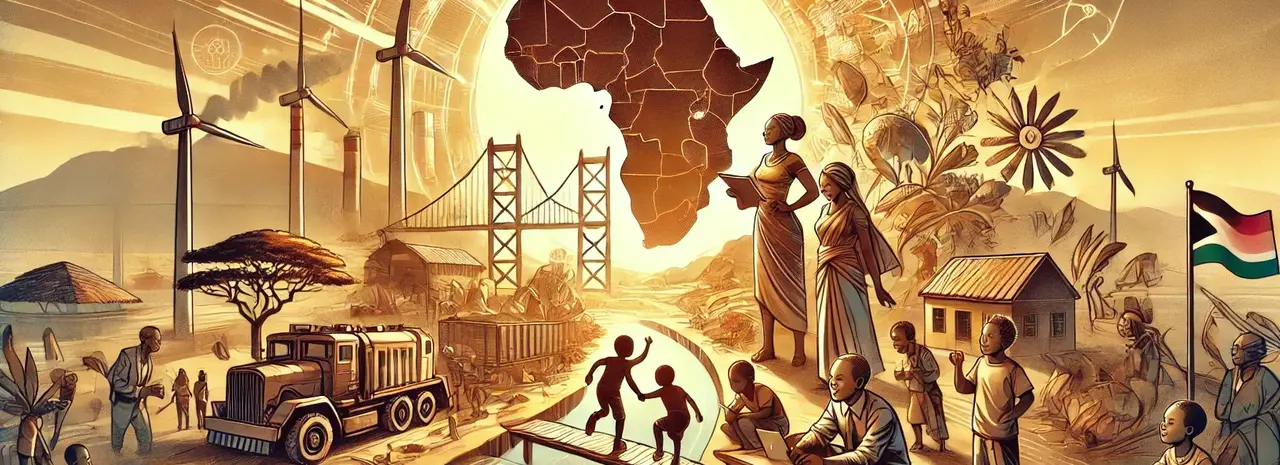
The new development reality: an in-country perspective from Genesis
25 March 2025
Staff perspectives | Stephan Malherbe
We all now recognise that 2025 marks an irreversible change in international development. The drastic reductions in USAID funding is part of a general trend of deep cuts in many donor countries as domestic priorities change. These cuts are unlikely ever to be restored. To use a potent German word, we’re experiencing a development zeitenwende: that moment in which one epoch comes to an end, and another epoch begins.
The epoch that has ended so abruptly was the golden age of development assistance, a half century of massive resource flows – cumulatively trillions of dollars – and historic achievements, particularly in health, human development and agriculture. But what keeps us busy is the epoch that is about to start. As an African-based development firm that has worked in more than 100 countries across the Young World to unlock social progress, we have seen from the inside how development has succeeded magnificently, and sometimes failed dismally.
From this vantage point comes a conviction: that these dramatic changes create the opening for a new and compelling development logic, one grounded in experiences of success. I shall discuss this opportunity below.
The last eight weeks at Genesis: baking in robustness.
As a USAID prime, Genesis was directly affected by the recent terminations. We immediately cut operating costs, restructured our teams and reduced overheads. As a result, we are already cash positive, and will remain so throughout this year. We are also entirely debt-free, and have an ample credit facility that we do not envisage using, putting us in a good position to weather any further shocks, buttressed by an unusually diverse client base. In making these changes, we’ve ensured that our programme management skills, technical depth and ability to deliver impact have not been compromised. We’re proud of the ongoing commitment of our almost 300 staff in 18 countries.
The immediate challenge: a social services funding cliff in African countries.
Through our deep relationships with the countries in which we live and work, we’re in touch with governments experiencing abrupt severance of US Government funding. We’re working in-country with partners to manage this crisis through a combination of re-prioritising funding from elsewhere, emergency efficiency savings, and improved cash management and budget execution. These immediate measures are about averting the loss of life and safeguarding quality of life from disrupted service delivery. We have also developed a tool for all countries to provide an initial sense of how large these cuts are, and an initial estimate of where the impacts will be felt.
In health, the epicentre of the funding crisis, Genesis has launched a Health Transition Taskforce to help countries identify the impact of the withdrawal of funding and key services, as well as ways to mitigate these.
Across all the social sectors, the medium-term challenge is to help countries devise a feasible path through better fiscal planning, and towards more efficient delivery systems supported by multiple funding streams, areas in which we have been in effective partnerships with various funders and countries.
A new development logic: working from the inside, outwards
These challenges illustrate what is perhaps the most important long-term effect of the changes: a new accountability on the part of national governments. Having worked closely with governments for 27 years, we know that performance doesn’t always follow accountability. Still, it is a major shift that – with the right scaffolding – can change the game.
Consider the greatest development success stories of the last half century, whether in postwar Western Europe, post-Communist Eastern Europe or Asia, including the giants Japan, China and India. Throughout their development process, all those countries were profoundly reliant on the outside world: for expertise, institutional models, technology, capital and market access.
But – critically – each country was the initiator, each set its own agenda and made the key plans. In doing that, they had to conduct themselves in a way that would attract those critical foreign resources. In short, development initiatives started inside, and worked their way outwards to gather in the support and resources they needed from external sources. Startlingly, this is not how most development worked during the ‘golden age’ of ODA: the standard situation was initiatives started externally – and remained driven externally. It’s time to flip this script, but with performance as the key determinant of support.
It’s the job of organisations like ours to support this process. The immediate need is to strengthen countries and their processes. Then for a bridge to be built between proactive countries, on the one hand, and the global entities with the resources and capabilities to accelerate their progress, on the other. In this world, foundations, multilaterals, and global centres of expertise remain critical, as catalysts and allies, to countries that take their new accountability seriously.
There is so much to do right now, and much to figure out, collectively!
Stephan